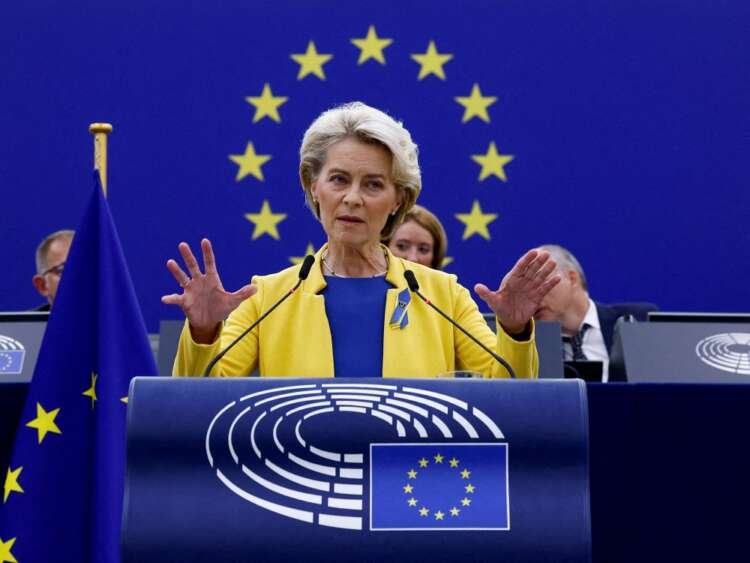EU proposes windfall levies on energy firms to ease price pain
Published by Jessica Weisman-Pitts
Posted on September 14, 2022
4 min readLast updated: February 4, 2026

Published by Jessica Weisman-Pitts
Posted on September 14, 2022
4 min readLast updated: February 4, 2026

By Kate Abnett
BRUSSELS (Reuters) -The European Union’s executive plans to raise more than 140 billion euros ($140 billion) to shield consumers from soaring energy prices by skimming off revenues from low-cost electricity generators and making fossil fuel firms share windfall profits.
The European Commission published the proposals on Wednesday as the 27-member European Union grapples with an energy crisis fuelled by Russia’s invasion of Ukraine.
Governments across Europe have already ploughed hundreds of billions of euros into tax cuts, handouts and subsidies to tackle a crisis that is driving up inflation, forcing industries to shut production and hiking bills ahead of winter.
“In these times, profits must be shared and channelled to those who need it most,” European Commission President Ursula von der Leyen told the EU Parliament in Strasbourg, adding that the plans should raise more than 140 billion euros for member states to rechannel into helping businesses and retail consumers.
EU countries will have to negotiate the Commission’s proposals and agree on final laws.
The plan did not include an earlier idea to cap Russian gas prices. EU countries are divided over whether broader gas price caps would help or harm efforts to secure winter supplies.
With gas price caps off the table, at least for now, some diplomats were optimistic that deals could be struck at a meeting of EU energy ministers on Sept. 30.
Von der Leyen said the Commission was “discussing” price caps and had launched talks with Norway on lowering gas prices.
The Commission proposals would skim off excess revenues from wind, solar, nuclear and lignite coal plants, by imposing a cap of 180 euros ($180) per megawatt hour (MWh) until March on the revenue they receive for generating electricity.
That would cap generators’ revenues at less than half of current market prices. EU power prices are typically set by gas, so the measure would apply to generators that sell their power at those soaring prices but do not need to buy expensive fuel.
Germany’s front-year electricity price was trading at just below 500 euros/MWh on Wednesday.
‘INVESTOR CONFIDENCE’
Europe’s electricity industry body Eurelectric said on Wednesday that capping reveues for renewable energy generators risked damaging investor confidence in the sector.
The EU said the measure was designed to ensure generators would still be profitable and had spare cash to invest in the vast build-out of wind and solar needed to meet climate goals.
“The profits they are now collecting go way, way, way beyond anything they have dreamed of before when making their investment plans,” EU climate chief Frans Timmermans said.
“The business case for investing in renewables is huge,” he added, citing high fossil fuel prices as one factor for this.
Fossil fuel firms would face a separate windfall levy under the EU plans, to claw back profit from soaring prices stoked by Russia slashing gas deliveries since its invasion of Ukraine.
Oil, gas, coal and refining firms would be required to contribute 33% of their taxable surplus profit from fiscal year 2022, the EU proposals said.
Von der Leyen said the bloc was also working to establish a “more representative benchmark” price for gas than the Dutch Title Transfer Facility (TTF).
Brussels is looking into amending collateral requirements in energy markets to help companies facing a liquidity squeeze, she said.
The EU also proposed a mandatory target for countries to cut electricity by 5% use during peak hours, in a bid to save fuel.
EU countries’ gas storage caverns are now 84% full – a healthy pre-winter level – but analysts say Europe will still need deep cuts in fuel use over winter to avoid shortages.
Separately, the EU is planning a deeper overhaul of its electricity market to decouple power prices from the soaring cost of gas.
($1 = 0.9992 euros)
(Reporting by Kate Abnett and Ingrid Melander; additional reporting by Susanna Twidale; Editing by Mark Potter, Edmund Blair, Alexander Smith, Louise Heavens and David Evans)
A windfall profit refers to an unexpected or sudden financial gain that is significantly higher than what is considered normal or expected.
Renewable energy is energy generated from natural resources that are replenished, such as sunlight, wind, rain, tides, waves, and geothermal heat.
An energy cap is a limit set on the price that energy suppliers can charge consumers for their energy usage, aimed at protecting consumers from excessive costs.
Inflation is the rate at which the general level of prices for goods and services rises, eroding purchasing power.
The European Commission is the executive branch of the European Union responsible for proposing legislation, implementing decisions, and upholding EU treaties.
Explore more articles in the Finance category




